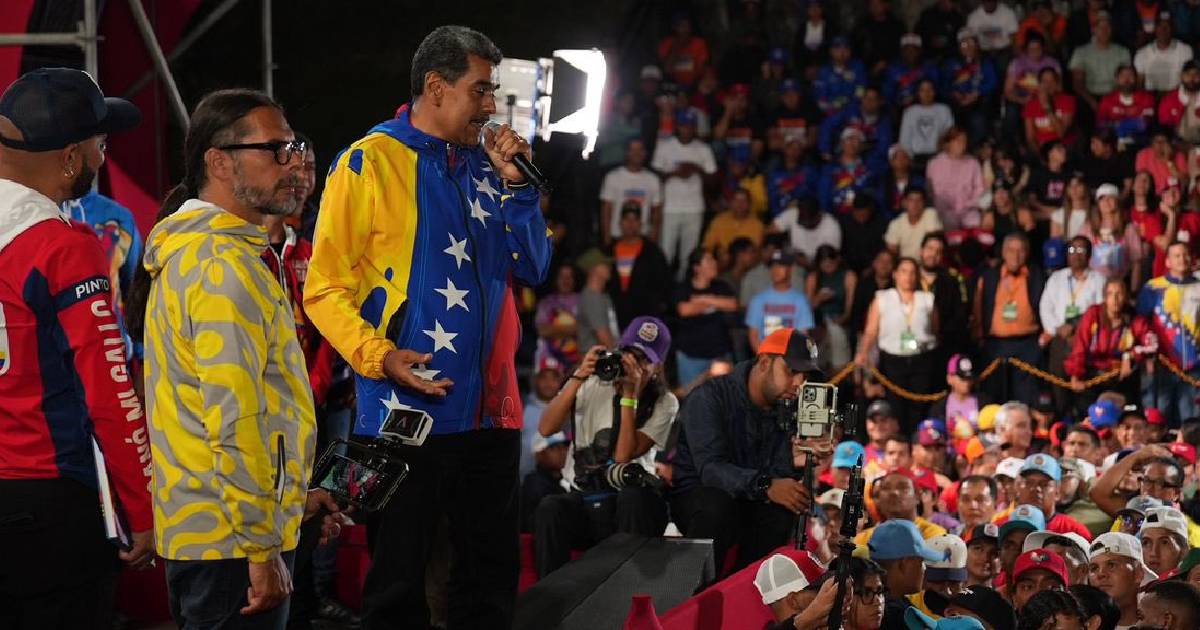
The controversial reelection of Venezuelan ruler Nicolás Maduro continues to provoke significant reactions within the international community, where the majority of countries either do not recognize the results or have been cautious in expressing their opinions on the statement from the Electoral Council of the South American nation.
This Monday, July 29, 2024, the electoral authority dominated by supporters of chavismo announced Maduro's reelection, a result that immediately unleashed a wave of protests and rejection from the opposition and a significant part of the population.
One of the first was the Chilean president Gabriel Boric, who through his account on X said that "the Maduro regime must understand that the results it publishes are hard to believe."
"The international community and especially the Venezuelan people, including the millions of Venezuelans in exile, demand total transparency of the records and the process, and that international observers not committed to the government report on the validity of the results," he added.
Furthermore, he stated that Chile will not recognize "any result that is not verifiable."
Another questioning came from Uruguay when President Luis Lacalle Pou stated there were irregularities in the election process and the counting, declaring that "it was clearly tainted" and that "a victory cannot be recognized if there is no trust in the way and the mechanisms used to achieve it."
The Colombian chancellor Luis Gilberto Murillo requested "the total counting of the votes, their verification, and an independent audit."
For the Minister of Foreign Affairs of the coffee-producing nation, everyone "hopes that transparency and electoral guarantees prevail for all sectors," and it is important to clear up any doubts about the results, which implies "that international observers and monitors present their conclusions about the process," he wrote on X.
From Tokyo, U.S. Secretary of State Antony Blinken expressed "serious concerns that the announced outcome does not reflect the will or votes of the Venezuelan people."
Blinken added that "it is essential that each vote is counted fairly and transparently, that electoral officials immediately share information with the opposition and independent observers without delay, and that the electoral authorities publish a tally of the votes."
While the president of Costa Rica, Rodrigo Chaves, described the elections as "fraudulent" in a statement and declared that his government "categorically repudiates the proclamation of Nicolás Maduro as president of the Bolivarian Republic of Venezuela."
"We will work with the democratic governments of the continent and international organizations to ensure that the sacred will of the Venezuelan people is respected," Chaves added.
The president of Mexico, Andrés Manuel López Obrador, behaved cautiously, as he spoke during a conference on Monday morning about waiting to have the definitive results.
"We are going to wait for them to finish counting the votes. We have information that the electoral body in Venezuela is giving the victory to President Maduro, that is what we know,” said AMLO.
From the presidency of Panama, President José Raúl Mulino announced on Monday the suspension of diplomatic relations with Venezuela and the withdrawal of its staff from the South American country.
There were also reactions from the European Union. Its High Representative for Foreign Affairs and Security Policy, Josep Borrell, stated that "the Venezuelan people voted on the future of their country peacefully and massively. Their will must be respected," he wrote on the social network X.
Although he pointed out that "it is vital to ensure total transparency of the electoral process, including the detailed counting of votes and access to the voting records from polling stations."
Other reactions of concern have been expressed from Brazil, Ecuador, Peru, Italy, Great Britain, Argentina, among other countries.
Reactions in favor of Maduro's declared victory
However, for the proclaimed president of Venezuela, not all messages have been ones of lack of recognition. His allies in the region (Cuba, Bolivia, Nicaragua, and Honduras), as well as Russia, China, Qatar, and Iran, have expressed their satisfaction with the alleged achievement of Maduro's third term.
"I spoke with brother Nicolás Maduro to convey warm congratulations on behalf of the Party, the Government, and the Cuban people for the historic electoral victory achieved, following an impressive demonstration by the Venezuelan people," wrote the designated Cuban leader Miguel Díaz-Canel on X.
Meanwhile, the president of Honduras, Xiomara Castro de Zelaya, sent her "special congratulations and Democratic, Socialist, and Revolutionary greetings to President Nicolás Maduro and the brave people of Venezuela for their undeniable victory, which reaffirms their sovereignty and the historical legacy of Commander Hugo Chávez."
Russian President Vladimir Putin highlighted the "strategic partnership" of Russian-Venezuelan relations and stated that he trusts Maduro "will continue to contribute to its progressive development in all areas... Remember that you will always be welcome on Russian soil," said the Russian leader, according to the country's Foreign Ministry.
"China is willing to enrich our strategic partnership and benefit the people of both countries more," stated Lin Jian, spokesperson for the Chinese Ministry of Foreign Affairs, at a press briefing, according to AFP.
What do you think?
COMMENTFiled under: